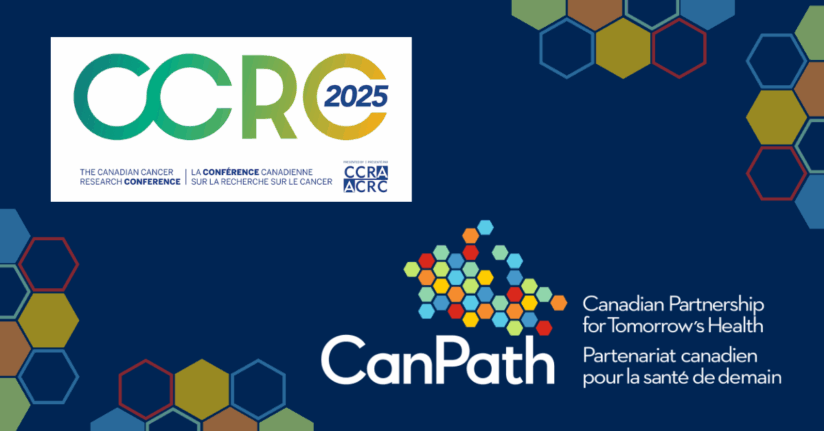CanPath and regional cohorts to share new cancer research insights at the 2025 Canadian Cancer Research Conference

CanPath and its regional cohorts will be well represented at this year’s Canadian Cancer Research Conference (CCRC), taking place November 2–4 in Calgary, Alberta.
Bringing together researchers, trainees, clinicians, decision-makers, and patients from across the country, CCRC 2025 is an opportunity to explore the latest discoveries across Canada’s cancer research spectrum and connect across disciplines.
This year, CanPath researchers and collaborators will share findings that span prevention, screening, data science, and cohort infrastructure, demonstrating the power of Canada’s largest population health study to advance cancer prevention.
Workshop
CanPath will host a three-hour Synthetic Dataset Workshop on Monday, November 3, introducing attendees to CanPath’s synthetic dataset and Trusted Research Environment (TRE).
The interactive session will guide researchers through simulated CanPath data, demonstrating how synthetic data and secure cloud environments can accelerate learning, collaboration, and reproducible research.
Oral presentations
Dr. Maryam Darvishian, University of British Columbia
- Breast cancer screening engagement among women with different ethnic backgrounds
- Predictors of participation in cervical cancer screening
Dr. Mariam Mehran, Q-CROC (Clinical Research in Oncology)
- Lifetime occupational and domestic environmental exposures and breast cancer risk
Poster presentations
Dr. Travis Hrubeniuk, Manitoba Tomorrow Project / Cancer Care Manitoba: Lessons learned in building a population-based cohort for cancer research
Katarina Maksimovic, MSc, Ontario Institute for Cancer Research: Biobanks, research, and resources related to oncology samples and data
Dr. Sam Kenston, University of British Columbia: Built environment influences on adherence to cancer prevention guidelines, incidence, and mortality
Laura Pelland-St-Pierre, University of Montreal: Occupational exposure to endocrine-disrupting chemicals and breast and prostate cancer
Dr. Rachel Murphy, University of British Columbia: Exploring diet and activity across the cancer trajectory
Theresa Vo, MSc, Memorial University: Repeated breast cancer screening uptake among Chinese immigrants
Alyssa Milano, MSc, BC Cancer: Precision cancer prevention and unravelling heterogeneity in dietary intake and metabolic health
Jean Claude Bigenimana, BC Cancer: Using natural language processing to create a virtual tumour repository for cancer research
Ace Chan, MSc, University of British Columbia: Changes in cancer-causing substance use during the COVID-19 pandemic among gender minority populations
Laura Grant, Alberta’s Tomorrow Project: Research opportunities and building a cancer trajectory biobank
Dr. Grace Shen-Tu, Alberta’s Tomorrow Project: Leveraging data and biosamples to unlock new cancer and chronic disease insights
Dr. Sara Nejatinamini, Alberta’s Tomorrow Project: Disparities in geospatial patterns of cervical cancer screening and associated risk factors
Dr. Jason Xu, Alberta’s Tomorrow Project: Concordance between self-reported and administrative data on cervical cancer screening
Melanie Matte, MPH, University of Calgary: Insights from the development of a mobile phone app for cancer prevention research
Stay tuned as we share highlights and takeaways from CCRC 2025!